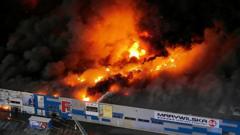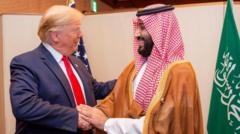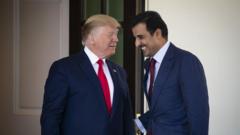Zelensky’s offer for direct talks came shortly after former President Donald Trump recommended that Ukraine engage with Putin immediately in Turkey to assess the potential for peace. He emphasized the need for urgency in resolving the conflict and welcomed the prospect of a ceasefire as a prerequisite for negotiations.
Zelensky Willing to Meet Putin Following Trump's Urging for Direct Talks

Zelensky Willing to Meet Putin Following Trump's Urging for Direct Talks
Ukrainian President Volodymyr Zelensky has expressed readiness to meet with Russian President Vladimir Putin in Istanbul while seeking a ceasefire to facilitate discussions aimed at ending the ongoing war.
In a significant development in the ongoing conflict, Ukrainian President Volodymyr Zelensky has stated that he is prepared to meet Russian President Vladimir Putin in Istanbul on Thursday to negotiate an end to the war. This announcement coincides with former President Donald Trump’s call for Ukraine to accept Putin’s offer of direct talks. Zelensky highlighted the urgency to end hostilities, indicating that he would await a positive response from Russia regarding a ceasefire.
Earlier in the week, during a meeting in Kyiv with European leaders, calls were made for a 30-day pause in the fighting, aiming to create a conducive environment for diplomacy. Trump's social media post urged Ukraine to agree to talks promptly to clarify the situation and explore potential resolutions to the conflict. He reiterated that this meeting could help in determining the viability of a peace deal, thus influencing the actions of European leaders and the US.
Zelensky, while advocating for direct dialogue, reiterated the necessity of a firm and comprehensive ceasefire before such talks could take place. In a statement on social media, he expressed hope that Russia would respond positively to calls for a ceasefire to establish a framework for negotiations.
Putin had previously invited Ukraine for "serious negotiations" in his late-night address and suggested that the discussions could pave the way for a new understanding between both nations. However, he did not directly respond to demands for a ceasefire. Moscow has also indicated that any ceasefire considerations would be contingent upon the West ceasing its military support for Ukraine.
The last direct talks between Russia and Ukraine occurred in March 2022 in Istanbul shortly after the commencement of Russia's invasion. Recent discussions in Kyiv, attended by top European leaders, underscored the urgency of a ceasefire, with strong warnings of potential severe sanctions against Russia’s energy and banking sectors should negotiations fail to yield progress.
As the situation unfolds, analysts suggest that the dynamics of international pressure from the West, especially with Trump’s intervention, could play a pivotal role in determining the outcome of potential negotiations. The complexities of the geopolitical landscape following the war continue to demand close attention.
Earlier in the week, during a meeting in Kyiv with European leaders, calls were made for a 30-day pause in the fighting, aiming to create a conducive environment for diplomacy. Trump's social media post urged Ukraine to agree to talks promptly to clarify the situation and explore potential resolutions to the conflict. He reiterated that this meeting could help in determining the viability of a peace deal, thus influencing the actions of European leaders and the US.
Zelensky, while advocating for direct dialogue, reiterated the necessity of a firm and comprehensive ceasefire before such talks could take place. In a statement on social media, he expressed hope that Russia would respond positively to calls for a ceasefire to establish a framework for negotiations.
Putin had previously invited Ukraine for "serious negotiations" in his late-night address and suggested that the discussions could pave the way for a new understanding between both nations. However, he did not directly respond to demands for a ceasefire. Moscow has also indicated that any ceasefire considerations would be contingent upon the West ceasing its military support for Ukraine.
The last direct talks between Russia and Ukraine occurred in March 2022 in Istanbul shortly after the commencement of Russia's invasion. Recent discussions in Kyiv, attended by top European leaders, underscored the urgency of a ceasefire, with strong warnings of potential severe sanctions against Russia’s energy and banking sectors should negotiations fail to yield progress.
As the situation unfolds, analysts suggest that the dynamics of international pressure from the West, especially with Trump’s intervention, could play a pivotal role in determining the outcome of potential negotiations. The complexities of the geopolitical landscape following the war continue to demand close attention.



















